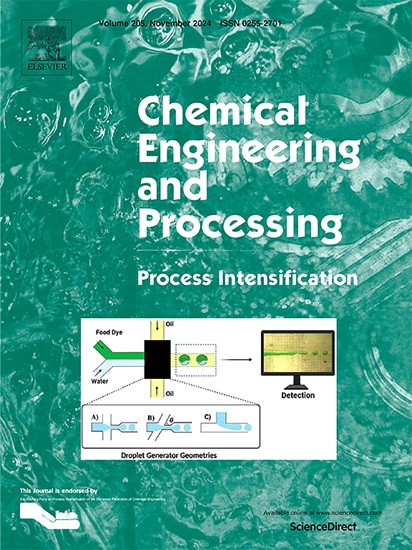Purification of 1-butanol from rich and lean aqueous heteroazeotropic mixture by sponge-like ionic liquid process
IF 3.8
3区 工程技术
Q3 ENERGY & FUELS
Chemical Engineering and Processing - Process Intensification
Pub Date : 2025-05-08
DOI:10.1016/j.cep.2025.110356
引用次数: 0
Abstract
The Acetone-Butanol-Ethanol (ABE) fermentation process is a promising approach for sustainable biobutanol production. However, separation and purification of butanol following membrane-based or distillation separation processes remain challenging due to the formation of a water-butanol heteroazeotropic mixture (55.5 wt% 1-butanol), requiring multiple distillation columns and generating both lean and rich aqueous phases. In this study, a novel sponge-like ionic liquid extraction process was employed to recover 1-butanol from these aqueous mixtures using 1-Methyl-3-octadecylimidazolium bis(trifluoromethyl sulfonyl)imide (C18MIM[Tf2N]). The liquid C18MIM[Tf2N] was contacted with a rich and lean butanol aqueous phases at temperatures above IL´s melting point (60 °C to 90 °C) and an IL/aqueous ratio of 1:1. After phase separation, the IL solidified at room temperature, allowing the extraction of the dissolved component via centrifugation.
The results indicated that optimal recovery from the lean phase occurred at 80 °C, achieving enhanced solubility of 1-butanol in the IL while minimizing losses. Under these conditions, the remaining aqueous phase contained only 1 wt% 1-butanol, and over 95 % of the butanol was recovered from the IL. For the rich phase, high butanol concentrations altered the hydrophobicity of C18MIM[Tf2N], causing water retention and resulting in an aqueous phase with a higher butanol content. These findings highlight the potential of sponge-like IL extraction for efficient butanol purification, reducing energy-intensive distillation steps.

海绵状离子液体法纯化富贫杂共沸混合物中的1-丁醇
丙酮-丁醇-乙醇(ABE)发酵工艺是一种很有前途的可持续生产生物丁醇的方法。然而,由于形成水-丁醇异共沸混合物(55.5 wt% 1-丁醇),膜分离或蒸馏分离丁醇的分离和纯化仍然具有挑战性,需要多个精馏塔,并产生贫水相和富水相。本研究以1-甲基-3-十八烷基咪唑双(三氟甲基磺酰基)亚胺(C18MIM[Tf2N])为原料,采用一种新型的海绵状离子液体萃取工艺从这些水混合物中回收1-丁醇。液体C18MIM[Tf2N]与富丁醇和贫丁醇水相接触,温度高于IL的熔点(60℃~ 90℃),IL/水比为1:1。相分离后,IL在室温下固化,允许通过离心提取溶解的成分。结果表明,贫相的最佳回收率发生在80℃,提高了1-丁醇在IL中的溶解度,同时减少了损失。在这些条件下,剩余的水相中只含有1wt %的1-丁醇,超过95%的丁醇从IL中回收。对于富相,高丁醇浓度改变了C18MIM[Tf2N]的疏水性,导致水潴留,从而导致水相中丁醇含量较高。这些发现突出了海绵状IL提取在高效丁醇净化方面的潜力,减少了能源密集型的蒸馏步骤。
本文章由计算机程序翻译,如有差异,请以英文原文为准。
求助全文
约1分钟内获得全文
求助全文
来源期刊
CiteScore
7.80
自引率
9.30%
发文量
408
审稿时长
49 days
期刊介绍:
Chemical Engineering and Processing: Process Intensification is intended for practicing researchers in industry and academia, working in the field of Process Engineering and related to the subject of Process Intensification.Articles published in the Journal demonstrate how novel discoveries, developments and theories in the field of Process Engineering and in particular Process Intensification may be used for analysis and design of innovative equipment and processing methods with substantially improved sustainability, efficiency and environmental performance.

 求助内容:
求助内容: 应助结果提醒方式:
应助结果提醒方式:


